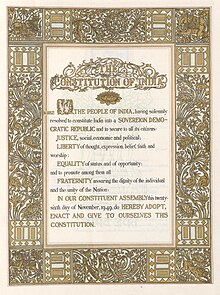| This article is part of a series on |
| Judiciary of India |
|---|
 |
| Law of India |

| Part of a series on the |
| Constitution of India |
|---|
 |
| Preamble |
The legal system of India consists of civil law, common law, customary law, religious law and corporate law within the legal framework inherited from the colonial era and various legislation first introduced by the British are still in effect in modified forms today. Since the drafting of the Indian Constitution, Indian laws also adhere to the United Nations guidelines on human rights law and the environmental law. Personal law is fairly complex, with each religion adhering to its own specific laws. In most states, registering of marriages and divorces is not compulsory. Separate laws govern Hindus including Sikhs, Jains and Buddhist, Muslims, Christians, and followers of other religions. The exception to this rule is in the state of Goa, where a uniform civil code is in place, in which all religions have a common law regarding marriages, divorces, and adoption. On February 7, 2024, the Indian state of Uttarakhand also incorporated a uniform civil code. In the first major reformist judgment for the 2010s, the Supreme Court of India banned the Islamic practice of "Triple Talaq" (a husband divorcing his wife by pronouncing the word "Talaq" thrice).[1] The landmark Supreme Court of India judgment was welcomed by women's rights activists across India.[2]
As of August 2024[update], there are about 891 Central laws as per the online repository hosted by the Legislative Department, Ministry of Law and Justice, Government of India.[3] Further, there are many State laws for each state, which can also be accessed from the same repository.
- ^ Wu, Huizhong (23 August 2017). "Triple talaq: India's top court bans Islamic practice of instant divorce". CNN. Archived from the original on 6 September 2017. Retrieved 3 February 2018.
- ^ Safi, Michael; Amrit Dhillon (22 August 2017). "India court bans Islamic instant divorce in huge win for women's rights". The Guardian. Delhi. Archived from the original on 16 November 2017. Retrieved 3 February 2018.
- ^ "India Code: Browsing DSpace". www.indiacode.nic.in. Retrieved 26 July 2022.